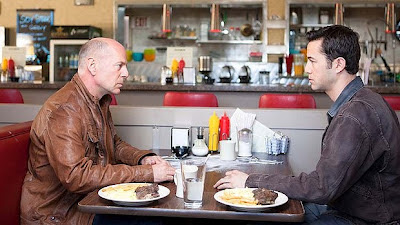Rian Johnson's 2005 teen noir Brick and 2008 con man film The Brothers Bloom are two of my favorite films of the past decade, so naturally I was curious to see if Johnson's talents would continue to grow with an ambitious science fiction idea and a comparatively huge budget this time out. The writer/director gamely rose to the challenge; Looper is easily one of the best films of the year, and instantly positions itself as one of the best time travel movies ever made.
Looper
Writer/Director: Rian Johnson
Starring: Joseph Gordon-Levitt, Bruce Willis, Emily Blunt
Kansas, 2044. "Time travel has not yet been invented, but thirty years from now it will have been." With these words, Johnson hurls us headlong into his sci-fi world, using voiceover narration from the young protagonist, Joe (Joseph Gordon-Levitt), to explain the rules of time travel and craft the setup of the story. In the 2070s, time travel is invented and almost immediately outlawed because of the dangerous implications it carries. As with most illegal things, the mafia finds special use for it; since it's nearly impossible to get rid of a dead body in the future, they use time travel to send victims back to 2044 and hire assassins known as "loopers" to shoot them in the chest precisely when they appear, thus providing an easy and clean way to dispose of a body that technically doesn't exist yet. If that sounds confusing, that's no fault of Johnson's; in the film, he doles out the perfect amount of exposition exactly when the audience needs it to stay along for the ride. The film never gets bogged down because the mechanics of time travel aren't even that important to the core of the plot, and Johnson has cited the way the device serves the story in The Terminator (time travel exists, is then pushed to the back burner) as an inspiration for how he handled it here.
Joe has been a looper for a long time, and though the gig pays pretty well and he has a bunch of money stashed away for safe keeping, it's not a business you can leave easily. See, the future mafia eventually decides they have to clean up every loose end, which means that future versions of the loopers get sent back to be killed by the younger versions of themselves. This is called "closing the loop," and since the victims all have bags over their heads when they arrive in 2044 and are shot as soon as they appear, the loopers don't know that they've killed their future selves until its too late. Then they cash out a big payday and continue their lives. Nice and easy...except, of course, when you "let your loop run," meaning that the future version escapes assassination and there are two versions of the same person running around at the same time. This is what happens to Joe when the future version of himself (Bruce Willis) comes back without the bag over his head and complicates things tremendously.
All of that is just a tiny sliver of the plot of Looper, enough to hopefully pique your interest and convince you to go check it out. As with Johnson's two previous films, this one is loaded with intriguing visual symbolism, brilliant sound design, terrific acting from some of Hollywood's top talents, layered writing, and an engaging story that works just as well if you want to view it as purely surface level entertainment or if you choose to delve into the fascinating philosophical questions it poses. Johnson's ability to make intelligent movies with a mainstream feel is on display more here than ever before, and I can't wait to see what the genre-hopping director has in store for us next. More than that, though, I can't wait to revisit Looper often, since - as to be expected with any time travel story - the ending leaves us with a lot to think about.
Joseph Gordon-Levitt puts his talent on display as a young Willis (aided by some good makeup and slightly distracting contact lenses), and it's wonderful to see Bruce Willis in a role he's clearly passionate about. (Barring Wes Anderson's Moonrise Kingdom, I can't recall the last time I truly enjoyed one of his performances. Lucky Number Slevin, probably.) A scene in which the two converse opposite each other in a diner (reminiscent of Pacino and De Niro in Michael Mann's Heat) is a highlight, along with a similar scene with JGL across from Jeff Daniels earlier in the film. Emily Blunt, Jeff Daniels, Noah Segan, Paul Dano, and Piper Perabo are all solid as well, but if there's one breakout star of this film, it's five-year-old Pierce Gagnon who steals scenes as Emily Blunt's character's son and provides a startling range of emotions with abilities that many older actors would envy. Nathan Johnson's score is intense and atmospheric, taking his unorthodox methods of applying musical scales on captured sounds to new heights.
Heading into 2012, Looper and The Dark Knight Rises were my two most anticipated movies of the year. While Christopher Nolan's conclusion to his Batman trilogy was a little disappointing, Rian Johnson exceeded my absurdly high expectations and is now batting three for three as a filmmaker in my book. I can't encourage you enough to see this movie in theaters, because not only will you be supporting the creative team behind this project, but also your ticket sales will send a message that audiences can handle smart, R-rated action films like this that actually make you think, instead of dumbed-down remakes like Total Recall. Until next time...






1 comment:
You require time to create that attractive and in addition real effort to make such a high-quality blog post .